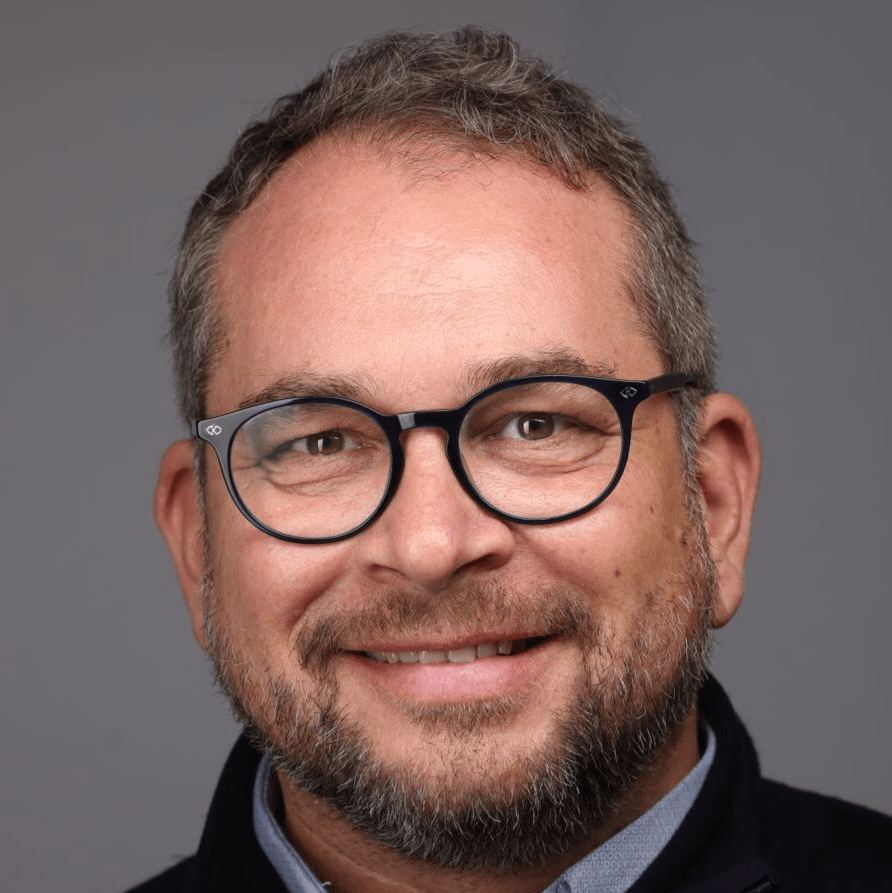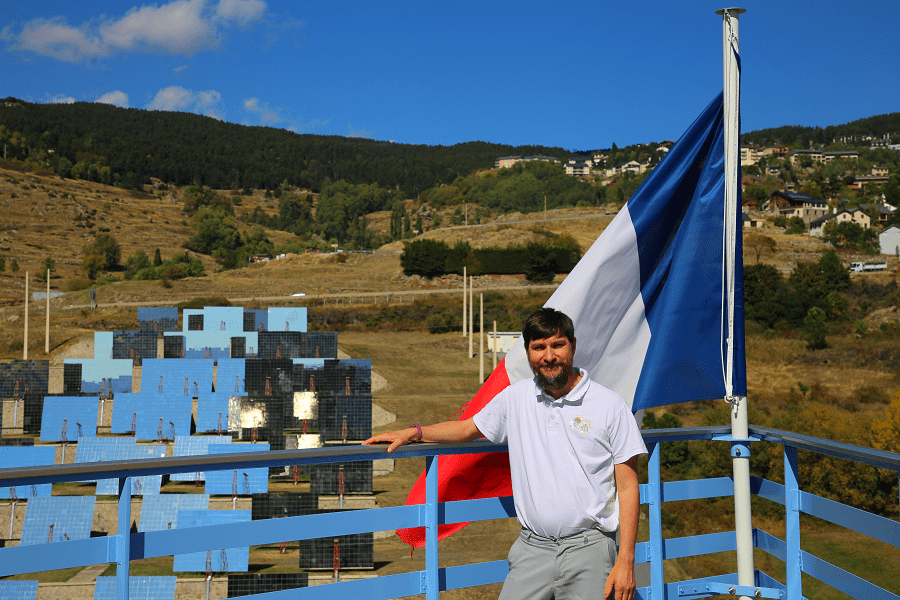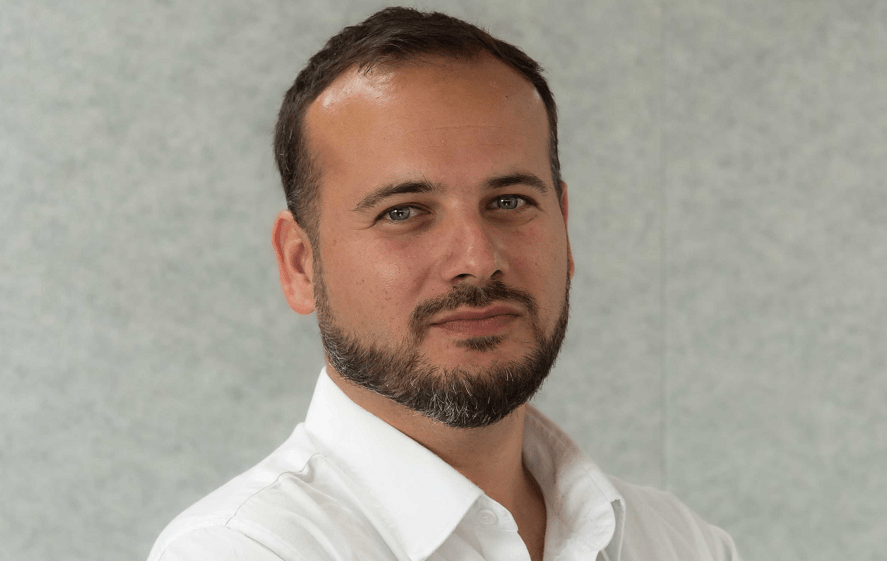Lorenzo Bramanti says, “I got on a boat before I could walk.” Lorenzo is a scientist with a passion for the sea and its mysteries. One of the world’s most respected scientists, he is an expert on corals and the workings of the underwater world, as well as the scientific co-director of the DEEPLIFE project with Under the Pole (a project supported by the Decade of Ocean Sustainability, 2021-2030 programme of the United Nations) and scientific leader of a project in cooperation with UNESCO and the 1 Ocean Foundation.
He is also the author of approximately 100 articles in international scientific journals, a lecturer in several languages around the world and frequently present on TV channel both in France (including ARTE.tv) and Italy ; but, above all, he is an explorer and underwater scientist.
Interview: Irina Rybalchenko, Manel Montoro
Why were you attracted to water and not land?
I was born in a small Mediterranean village. My great-grandfather was a sailor, my grandfather was a diver in the military special forces, my father, uncle and aunt were involved in underwater sports, freediving and diving. In summer we were always at the sea, I was used to seeing everyone disappear beneath the surface of the water…. What was I to do? It wasn’t a decision. If I wanted to stay with my family, I had to go into the water… such a poor kid!
But jokes aside – I feel most comfortable underwater. It gives me peace of mind but at the same time intellectual stimulation, a willingness to see what’s out there but without the stress and pressure. My head works better when it’s underwater.
What are the most important and interesting projects for you nowadays?
I’m passionate about and trying to follow many lines of research. But I can confidently say, at the moment, that developing the concept of the animal forest is something I’m fascinated with. It’s a new concept in ecology and conservation: corals, gorgonians, black corals…they’re all tree-like organisms whose three-dimensional shapes give complexity to the substrate. At high enough densities, they form veritable forests that modify the environment under their canopies, providing shelter and food for hundreds of species. However, corals are animals – not plants! Nothing like this exists on land! We have to come up with new definitions, find new rules and give them a new name: marine animal forests. It sounds like something out of a fantasy book, but instead we see them every day.
You work with Under the Pole and UNESCO. What are you latest discoveries ?
With Under the Pole, I’m studying the mesophotic marine animal forests. We’re discovering a lot about how underwater forests work, finding all the fascinating similarities with their terrestrial counterparts, but also the many differences. What I’d like to do on this expedition is to change the concept of conservation – to go from conserving a species to conserving the function of that species in the ecosystem.
What’s important to me in protecting the gorgonians? If there are only one or a few left, we may have protected the species, but what about the function it fulfils in the ecosystem? What about the microclimate they generate and the shelter they provide? No one thinks of protecting a chestnut tree or a pine. We protect the forest, because it has a function in the ecosystem. In the sea, we haven’t reached that point yet. So, we need to look at things differently and see forests where others see corals.
One of Under the Pole’s three missions is an innovative approach to studying the underwater world. Could you tell us about these innovations (the Capsule programme)?
When I was young, I was fascinated by ethology. I admired the ethologists in documentaries who spent days and weeks in nature, observing animals and taking notes to understand their behaviour. I wanted to be an ethologist, but I also wanted to be a marine biologist…and why not a marine ethologist? I realised that there is no such thing as a marine ethologist. There are those who study the behaviour of cetaceans, but almost never in the water; always from a boat. There are those who study the behaviour of fish… especially in aquariums.
After all, you can’t spend your days underwater… unfortunately. Now, we dive underwater with repeaters, breathing TRIMIX gas mixtures to stay there longer, but we stay there for three hours, four hours…five hours… and then we have to go back. With the capsule, it’s different. You can stay underwater for days, constantly watching what’s going on outside, taking notes, but underwater. With the advent of the capsule, the profession of underwater ethologist was born.
You are the author of about 100 scientific articles. What worries you most today?
Scientific articles are a curious thing. They are mostly written for experts; very few people in the world read them. To be published, scientific articles have to be vetted by other scientists. They make sure that what is published is rigorously provable, reproducible and form pieces of knowledge that other scientists can build on. It seems that it was Newton who said that he was able to make his discoveries because he was able to “climb the shoulders of giants” to see farther.
The scientists who have published before us are the giants we rely on to keep going. Once a discovery is made, validated and published in the form of a scientific article, it becomes available to everyone and can be used as a basis for making other discoveries.
But the question was different, wasn’t it? I’m a marine ecologist; a coral specialist. I study functional ecology, conservation and restoration of coral systems, tropical, temperate, shallow water and deep water. I adore gorgonians, have a passion for Mediterranean red corals, and am obsessed with the mesophotic zone known as the “twilight zone” due to the drastic reduction in solar radiation. This part of the seafloor, between 60 and 200 metres deep, is relatively little explored and irresistibly draws me in.
About 90% of our oceans remain unexplored. What kind of new discoveries could humanity make?
I am convinced that the greatest scientific discoveries are made not when you find something new, but when you look at something with different eyes. To discover something, you have to ask new questions. It’s not enough to go around the world, looking for something no one has ever seen. It’s true, yes, we know very little about the ocean floor. But we also know very little about what we see every day. Even when the deepest parts of the seafloor are reached, mapped and described, there will still be an infinite number of things yet to be discovered and understood. And all these things and phenomena are waiting for minds that know how to ask the right questions.
What is a specific feature of the Mediterranean Sea compared to other seas and oceans?
I consider the Mediterranean Sea my home. It is here that I learned to swim, to sail, to dive…
Despite its small size and strong human presence, the Mediterranean Sea has an amazingly high biodiversity. It makes up only 1% of the world’s ocean surface but is home to about 18% of known marine species. With more than 17,000 identified species – and given its relatively small size – the biodiversity of the Mediterranean Sea is truly remarkable.
You are studying corals and gorgonians at depths of more than 100 metres. What would it mean for the ecosystem if they disappeared?
The death of gorgonians would be a catastrophic occurrence. In addition to the loss of beautiful animals that are a spectacular sight for divers, the mass mortality of these species would have a profound impact on the marine ecosystem.
When a population of gorgonians is wiped out, it is like wiping out an entire forest with all the species living in it. However, it is not necessary to wipe out all gorgonians to destroy a forest. If mortality is not complete, and a few gorgonians remain, their density will not be sufficient to form a forest, and we will, therefore, lose all the species that live in these forests. So we must realise that the risk is not the loss of the species itself, but the loss of the function that the species performs in the ecosystem.
The effects of the latest heat wave, particularly in the Mediterranean, have led to a dramatic loss of red gorgonian populations. In some places, populations have been reduced by 90% and almost completely wiped out. These findings have alarmed both the scientific community and the general public.
However, all the data on gorgonian mortality comes from monitoring, which is mainly done by recreational divers, called “citizen scientists,” and they represent an inexhaustible and fundamental source of data to aid our research. But recreational divers, like most scientists, rarely go below 40 metres in depth, whereas red gorgonians have a wide bathymetric range, meaning they can be found at depths from 15 to 100 metres deep.
So, when, in collaboration with the Ocean 1 Foundation and UNESCO, I decided to study what happens at depths below 40 metres, I found that populations of red gorgonians, between 40 and 90 metres below the surface, are virtually immune to extinction. We have found a kind of climatic refuge, a zone where changes in water temperature are not yet intense enough to cause the gorgonians to die…but for how long?
The interest of this discovery is not really to reassure us, but to ponder how much time we still have before climate change reaches deeper refuges.
Yes, the good news is that red gorgonians in the Mediterranean have not yet completely disappeared. But it is also a warning to those who must decide on CO2 policy, urging them to act before the deep seas are destroyed.
You say that nature is dynamic. How do you adapt to climate change?
The climate changes we are experiencing in the so-called Anthropocene are characterised by unprecedented speed. Temperatures are rising at a rate that has nothing to do with evolutionary processes. It is, therefore, very important not to misuse the correct scientific concepts: species can only adapt to climate changes if they are slow so that evolutionary processes can function… and this is not the case in the current situation.
We will lose many of the species we know today that will not be replaced by other species due to evolutionary timescales that are too long, and so the Earth will become poorer. So, what is left of the concept of adaptation is behavioural adaptation; that is, changing habits to accommodate other conditions.
Behavioural adaptation has limited room for manoeuvre, because physiology does not change. Furthermore, adaptation implies a reduction in quality of life and sacrifice. For example, we can adapt to not being able to grow olive trees because the conditions for their growth are impossible… and what kind of life would it be without extra virgin olive oil?
But jokes aside…it would be great if it were just a matter of producing extra virgin olive oil. The resulting social injustice that would result would be enormous: a lucky few would be able to use technology to counter the effects of climate change, and the majority of humanity would be forced to live in unacceptable conditions.
This is not the future I would like for our planet.
How do you see the future of the planet and humanity?
I don’t believe I have enough knowledge to predict the future of this planet. There are days when my self-confidence is at its lowest – when there seems to be no progress towards realisation. And, on such days, it seems that the planet has no lasting future. That’s when books come along that offer hope, such as a recent book by Spanish writer Cristina Romer Castillo. In her book, Anthropoceano, Dr Castillo, a CSIC scientist, gives many examples where the trend of negative human impact has been reversed, showing that it is, sometimes, possible to correct mistakes and reverse processes that seemed irreversible.
How do you see your immediate future?
In an endeavour to contribute to the advancement of knowledge and awareness, I will continue my research. And I will continue to enjoy what I do.
My father once said: “Do what you love, and you will never have to work a single hour in your life.”



















